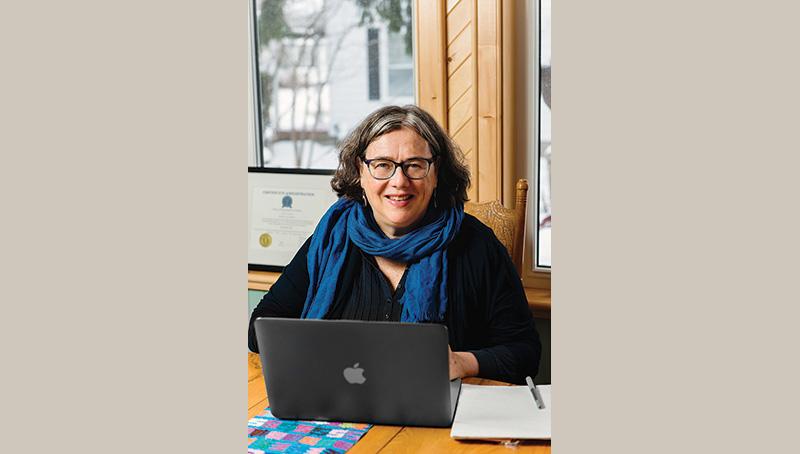This is a small-town success story. In this era of many people feeling like the online business is threatening the viability of small communities, homeopath Pat Deacon is making the internet work for her, in more ways than one.
Having lived in Vancouver, Ottawa and the United Kingdom, Deacon understandably has far-reaching connections. When she and her husband moved to Vankleek Hill a few years ago, she was already consulting with patients using interfaces like Skype and Facetime.
But the 23-year veteran homeopathic practitioner says that in recent months, she arrived at a personal crossroads. She had noticed that associations were offering webinars and paying instructors; she likewise returned to the idea that while most of the homeopathic profession consists of female practitioners, the teachers are men.
“Women are often consumers of men’s teaching. I was noticing the webinars being offered by organizations, but I thought to myself, ‘I can do this’,” explained Deacon.
She had already been mentoring other homeopaths one-on-one, she continued, but says it occurred to her that she wanted to do more. Several weeks ago, she launched her own webinar series, and set up a platform to offer it from her office in her Vankleek Hill home. For Deacon, it was the perfect meld of her skills: her interest in technology, her wanting to take control of the platform, the desire to teach and mentor and above all: her desire to do all of this from her home base in Vankleek Hill.
Deacon says that many homeopaths work from what she calls a “basic box” of 100 or 200 remedies. Over the years, she has expanded her own knowledge base and works with more than 7,000 remedies.
Perhaps here is where we should say a little bit about homeopathy. It is a natural form of medicine used by more than 200 million people worldwide to treat both acute and chronic conditions. It is based on the principle of ‘like cures like’. In other words, a substance taken in small amounts will cure the same symptoms it causes if taken in large amounts.
The holistic nature of homeopathy means each person is treated as a unique individual and their body, mind, spirit and emotions are all considered in the management and prevention of disease. Taking all these factors into account a homeopath will select the most appropriate medicine based on the individual’s specific symptoms and personal level of health to stimulate their own healing ability, according to the British Homeopathic Association website. The majority, but not all, homeopathic remedies are made from plants and minerals. (Deacon notes that an entire webinar this autumn is about mineral remedies.)
Homeopathy is as individual a treatment as you can get, says Deacon.
“Everybody I see in a month has a different remedy. And that is the satisfying part of what I do,” she says, comparing it to detective work as she speaks with patients, obtains a history and then matches the remedy to the person. “When the results are there and the patient feels better, that is what all homeopaths are aiming for,” she said.
She also says that there is a certain objectivity and focus when she works with clients at a distance, via the internet.
“The distractions of having someone in your office and thinking about being a good host, etc. just aren’t there when you are with someone via the internet. It is much easier to focus on the patient and what he or she has to say,” says Deacon.
At the heart of her new webinar series is empowering homeopaths. “If I can pass on tools and techniques to help other people be more precise in their prescribing of remedies, that is great,” she said. She offers one such example of group learning where all of those participating in the webinar bring a difficult case to the discussion.
“We are much more powerful when we are learning together.”
That these online opportunities exist is what will ensure the future of small towns and villages, she says, adding that her last webinar included participants from India, Denmark and Macedonia, to name just a few locations, although most of her webinar participants are from the United Kingdom.
“Our market is the world,” she said. You can live local, live cheaply and enjoy a quality of life that an urban centre does not offer, according to Deacon.
“It is heartbreaking to see dying places and communities. We need trains and smart public transport — then, we would see all communities revive. Young people today in many urban areas cannot even afford to buy homes. That is what we liked about Vankleek Hill. We purchased a home here and didn’t feel we had to apologize for owning a home when others couldn’t. Buying a home is within more people’s reach here than in the city, where young people are working three of four jobs to make their rent with no hope of purchasing,” she continued.
“The potential is there. We can each make our community the centre of the universe and spend all day in different places. This could happen in towns and countries around the world.”
You can find out more about Pat Deacon here.
From time to time, she offers two-hour learning workshops in Vankleek Hill.


